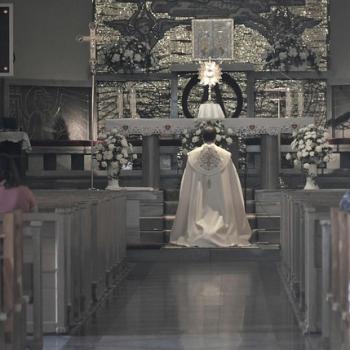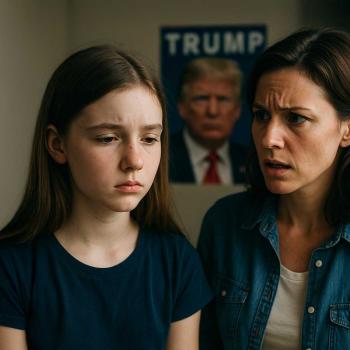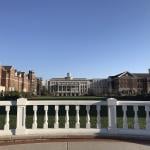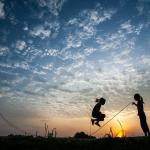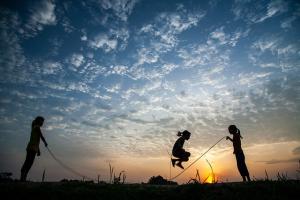
Jimmy’s boy comes by to inspect the garden at least twice a day.
He is terribly lonesome now that the Dodgers are gone, and there’s still a few weeks before school begins again. I said he’ll be old enough to take lessons at the church outreach this year, and I’ll be honored if he’ll come to my art class. I promised I’d take him to the dinosaur museum as soon as we catch up on bills and renew our membership, and he jumped up and down in excitement. But there’s nothing to do right now. We are both bored silly.
Sometimes, Jimmy’s boy brings an umbrella with him when he visits. It’s about the same size as he is, so I see the black fabric circle looming up the porch steps like a flying saucer. He explains he’s using it to keep cool in this awful heat, and he takes it with him when we go to see the garden. Sometimes, he leaves the umbrella in my foyer and comes in to read Adrienne’s old books. “I need first grade or Kindergarten reading because I’m bad at reading. But I need second grade math because math is my favorite subject!” And I set him up with a stack of books to borrow.
I worry about him. I worry about all the children in the neighborhood.
While we’re in the garden, Jimmy’s boy talks about his day. Sometimes he tells the truth, and sometimes he spins yarns, and sometimes he mixes a little of both.
“I don’t know if so-and-so is in jail or the hospital right now,” he mentioned once, naming his eldest brother. I knew he was telling the truth, because I’d seen the red and blue lights up the block and I knew his eldest brother has health problems. I assured him that his brother was in the hospital, not jail, and would be out soon.
“Did you know that when my dad dies, I’ll become a mechanic?” he said another day, and I had to ask him to back it up a bit. Apparently he’d heard of the concept of an inheritance somewhere, and somebody had mentioned he’d get his father’s set of car repair tools one day, and he filled in the rest with his imagination.
“Today I was in the middle of a shootout!” he said, on yet another occasion. “I ran through the middle of it. Two gangs were fighting! I grabbed two of them by the neck to defend myself! The police got there and let me off with a warning and I ran away!” and I knew that that was a tall tale– though I still warned him not to grab people by the neck. The police wouldn’t let him off with a warning in real life!
Today, I caught Jimmy’s boy committing a bit of petty larceny.
My block doesn’t have any driveways, only on-the-street parking. The neighborhood children know that when Sacre Bleu is missing from the curb, the Pezzulos aren’t in. When the ugly blue Nissan reappears in front of the house, they come running to say hello and ask for popsicles or cookies. And sometimes, the absence of the Nissan means it’s time to get into trouble. Today, as I drove up with Adrienne, I saw Jimmy’s boy walking up between my house and the house of the man who brought water, clutching a small zucchini to his chest. He started and ran when he saw me.
I followed him to the backyard, losing sight of him for a minute. As I tailed him I passed four of my paste tomatoes: two red, one yellow, one yellow and red, all smashed on the sidewalk as if they’d been used for water balloons. When I caught up, his hands were empty. I interrogated about the squash, and at first he started to fib. Finally, though, he showed me where he’d hidden the loot, in the tall grass near a basement window. But I couldn’t get him to plead guilty to the tomato theft.
Now it was my turn to tell a fib. “Well then, in addition to the camera on the front and back porch, I’m going to put a camera in my kitchen window to catch the tomato vandal! Will you help me catch him if I get him on film?”
Yes, he promised to help. He adjusted my porch camera to face the sunflowers, saying he wanted to take some films of the birds eating the centers.
Jimmy’s boy showed me the things he’d found in the garden while I was gone: a pie pumpkin, almost completely ripe. A yellow summer squash as long as my hand. A whole array of paste tomatoes, almost ready to harvest and cook. New sunflowers in red and yellow.
I worried again.
I always worry about the children.
I worry about the boy, and his brother with the health problems, because they say the cost of healthcare is going to go up and rural hospitals are going to close.
I worry about him when I see him swiping food to play with, because the cost of food is going up, and the food stamp disbursements nearly every child here depends on are going to go down.
I worry when he tells me he’d like to go to the museum and he wants to borrow my books, because all children deserve an education, but few in our country seem to value education. Some seem positively offended by the idea that a child should learn. Some seem to think that learning is dangerous.
We have plenty of money for bombs. We have plenty of money for airplanes for rich men. We have lots of money to make sure rich people don’t have to pay taxes. But we don’t have any money for children. And I can’t imagine a more terrible country, than one that has money for everything except children.
A just society would put the children first. No child would ever have to go without food or medicine, or a place to live, or an excellent school. We’d be throwing money at social workers and food pantries, libraries and museums, playgrounds and all kinds of things for children. But I don’t live in that society. I live in this one. So I show children the garden, and teach them to bake, and help out at the church outreach. And I know that’s not enough.
I can’t imagine a more godless society, than a society that will not be good to children. And I live in one, so I worry.
Jimmy’s boy finished entertaining me and went home.
I took the squash inside, and put it with the others. I’d better make another batch of zucchini bread for the neighbors this week.
This isn’t a fit world for children, but they come anyway. It’s time we all rose to the occasion and helped them.
Mary Pezzulo is the author of Meditations on the Way of the Cross, The Sorrows and Joys of Mary, and Stumbling into Grace: How We Meet God in Tiny Works of Mercy.



